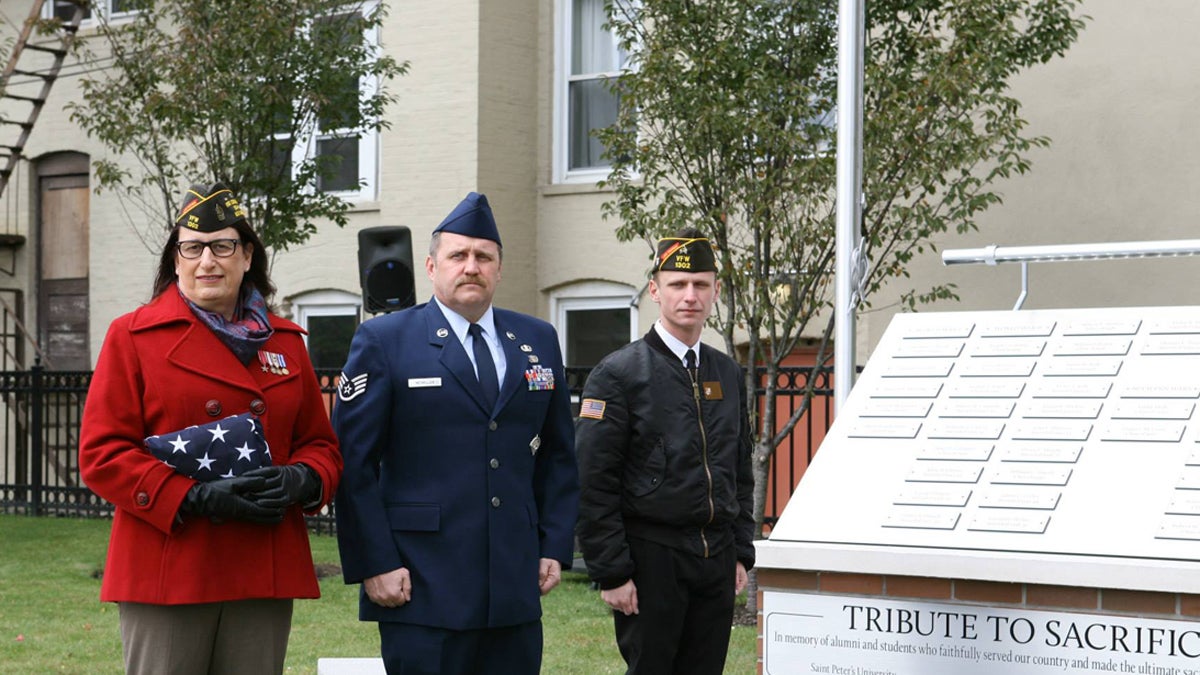Trump’s proposed ban on transgender military service proving unpopular on many sides

Jennifer Marie Long, (left), holds a flag during a ceremony in November 2014 dedicated to alumni of Saint Peter's University in Jersey City, New Jersey, who are veterans. (Provided)
Transgender service members have been able to serve openly in the U.S. military since last year. President Trump hopes to reimpose a ban on them, opening many questions and receiving scant support.
Jennifer Marie Long described President Donald Trump’s interest in banning transgender people from the military as a “kick in the gut to many.”
“It ripped through the community,” said Long, who is a transgender woman.
Long, who is from the suburbs of Newark, New Jersey, has a 30-year military career and retired in 2012. She served different roles in the United States Army Infantry. Her final tour was from 2010-2011 in Afghanistan where she was a combat adviser assigned to the French army.
President Donald Trump tweeted Wednesday morning that he wants to bar transgender people from serving in the military, citing “tremendous medical costs and disruption.”
His announcement did not say what would happen to transgender people already in the military.
The president tweeted that, after consulting with “Generals and military experts,” the government “will not accept or allow Transgender individuals to serve in any capacity in the U.S. Military.”
“Our military must be focused on decisive and overwhelming victory and cannot be burdened with the tremendous medical costs and disruption that transgender in the military would entail,” he added.
However, on Thursday, Marine Gen. Joe Dunford, who is chairman of the Joint Chiefs of Staff, said in a message to top military officials that there would be no modifications to the military’s transgender policy.
Transgender service members have been able to serve openly in the military since last year, when former Defense Secretary Ash Carter ended the ban. Since Oct. 1, transgender troops have been able to receive medical care and start formally changing their gender identifications in the Pentagon’s personnel system.
Carter also gave the services until July 1 to develop policies to allow people already identifying as transgender to newly join the military if they meet physical, medical, and other standards and have been living their gender identity for 18 months. Military chiefs recently announced a delay on allowing transgender people to enlist.
‘Pure and simple discrimination’
Trump’s decision drew immediate angry responses from groups that represent transgender service members, including the Philadelphia Office of LGBT Affairs.
Plans to ban trans individuals from the military are appalling.To trans community members – we see you, we love you, and we are here for you
— Philly LGBT Affairs (@PhillyLGBTgov) July 26, 2017
Amber Hikes, the executive director of the office, wrote in an e-mail statement that the ban violates the civil rights of the thousands of transgender soldiers who currently serve in the military.
“This is about much more than military service,” Hikes wrote. “It is a discriminatory attack on trans individuals, which serves to promote a hateful agenda and deny people their humanity.”
“In Philadelphia, we will continue to fight back to ensure people of trans experience have every possible right and protection under the law,” Hikes wrote. “The Mayor’s Office condemns this shameful and ill-considered action and will continue to stand in solidarity with our transgender brothers, sisters, and gender-nonconforming siblings, whether military or civilian.”
Race/gender/sexual orientat. & gender identity should never preclude anyone from serving their country. Always forward never back. #transban
— Amber Hikes (@AmberHikes) July 26, 2017
Malcolm Lazin, the executive director of Equality Forum, a national and international LGBT civil rights organization based in Philadelphia, reacted to the hypocrisy of Trump’s position.
“The president campaigned on saying that in terms of transgender, that they were welcome to use any bathroom of their choosing in Trump organization buildings,” Lazin said. “He followed it up by saying he would be a great friend of the LGBT community, so i am not quite sure how that comports with today’s decision.”
He added that he knows of no medical costs for transgender people — other than gender-confirmation surgeries and treatments — that would be different from those of any other U.S. citizen.
“Given the size of particularly our military budget, I can’t imagine it is much of a concern,” Lazin said. “But even if it is a concern, in terms of reassignment surgery, that is perhaps something the military could decide whether or not it wants to provide that particular service.”
Lazin said that this decision is “pure and simple discrimination” and will most likely be challenged in the courts.
WHYY reached out to the Mazzoni Center, a health care provider for Philadelphia’s LGBT community, and was directed to a public statement on their website.
“Transgender Americans have fought with honor and distinction for this country throughout history,” the statement reads. “Threatening to remove them from service after they put their lives at risk undermines our military.”
A step backward for the military?
The Pentagon has refused to release any data on the number of transgender troops currently serving. A Rand Corp. study estimated that there are between 2,500 and 7,000 transgender service members on active duty and an additional 1,500 to 4,000 in the reserves.
Long said if the thousands of transgender service personnel were to be fired, it would be detrimental to all military branches.
“You’ve got people in the military for many years with highly sought after skill sets and serving with distinction,” Long said. “You look at that and say, ‘Is this really the right course of action and why is such an impactful policy being put out on a Twitter feed?’ It’s nuts.”While she served in Afghanistan, Long said a number of people in her unit knew she was in transition and fully supported and respected her, treating her, in her words, as one of the females, even though she was serving in a mostly male role.
Long added that Trump’s announcement has a “direct comparison” to her time serving during the “Don’t Ask, Don’t Tell” LGBT policy era in the military.
When that policy was lifted in 2011, she said several studies were undertaken at every branch of the military to make sure people were prepared.
“There was no big epiphany, no crippling of the readiness of the U.S. forces whatsoever,” Long added. “Same thing with open trans service. We have so many serving right now openly, so if that is across the spectrum of the military and is no issue, why is this a distraction to U.S. forces?”
Henry Sias, a civil rights lawyer in Philadelphia and a transgender man, said he was mostly offended by the idea that the government would “nickel and dime” individuals who serve in the military over health care.
Service members are ready to lead on trans inclusion. If commander in chief isn’t, he should get out of the way. #TransRightsAreHumanRights
— Henry Sias (@Henry_Sias) July 26, 2017
“People who want to make that sacrifice, we should take care of them and not be at all sort of trying to negotiate a better deal where we provide less coverage to veterans,” said Sias, who has represented a transgender veteran in the past. “That is so disrespectful to me given the sacrifice they were willing to give. I feel we should pay for their healthcare and that that’s not a radical deal.”
Sias added that if transgender people serving in the military was a “disruption,” that it would’ve been more evident by now. He said the military often produce “the next generation of leaders” in government, education, and healthcare.
“Leadership is about standing next to people who are different from you,” said Sias, who ran in the spring for Court of Common Pleas judge. “I think [transgender service members] are very ready to lead on this and they have been demonstrating that for almost a year now.”
He added that if this ban were to play out, it would cause issues for military leaders who would want to stand up for the people who serve under them and would possibly be handled through the judicial branch.
It’s hard to find open support of this proposed ban among military officials and politicians, however, Rep. Vicky Hartzler (R-MO) stated her support of the ban to Wolf Blitzer on CNN’s “Wolf.” Two weeks ago, the congresswoman proposed an amendment to the 2018 National Defense Authorization Act, which would cut funding in the military budget for transition surgery and hormone therapy treatment.
Key concerns include whether currently enlisted troops have had medical or other issues that cause delays or problems with their ability to deploy or meet physical or other standards for their jobs. Military leaders also wanted to review how transgender troops are treated, if they’re discriminated against or if they have had disciplinary problems, defense officials have said.
The defense officials were not authorized to discuss internal deliberations publicly so spoke on condition of anonymity.
WHYY is your source for fact-based, in-depth journalism and information. As a nonprofit organization, we rely on financial support from readers like you. Please give today.





